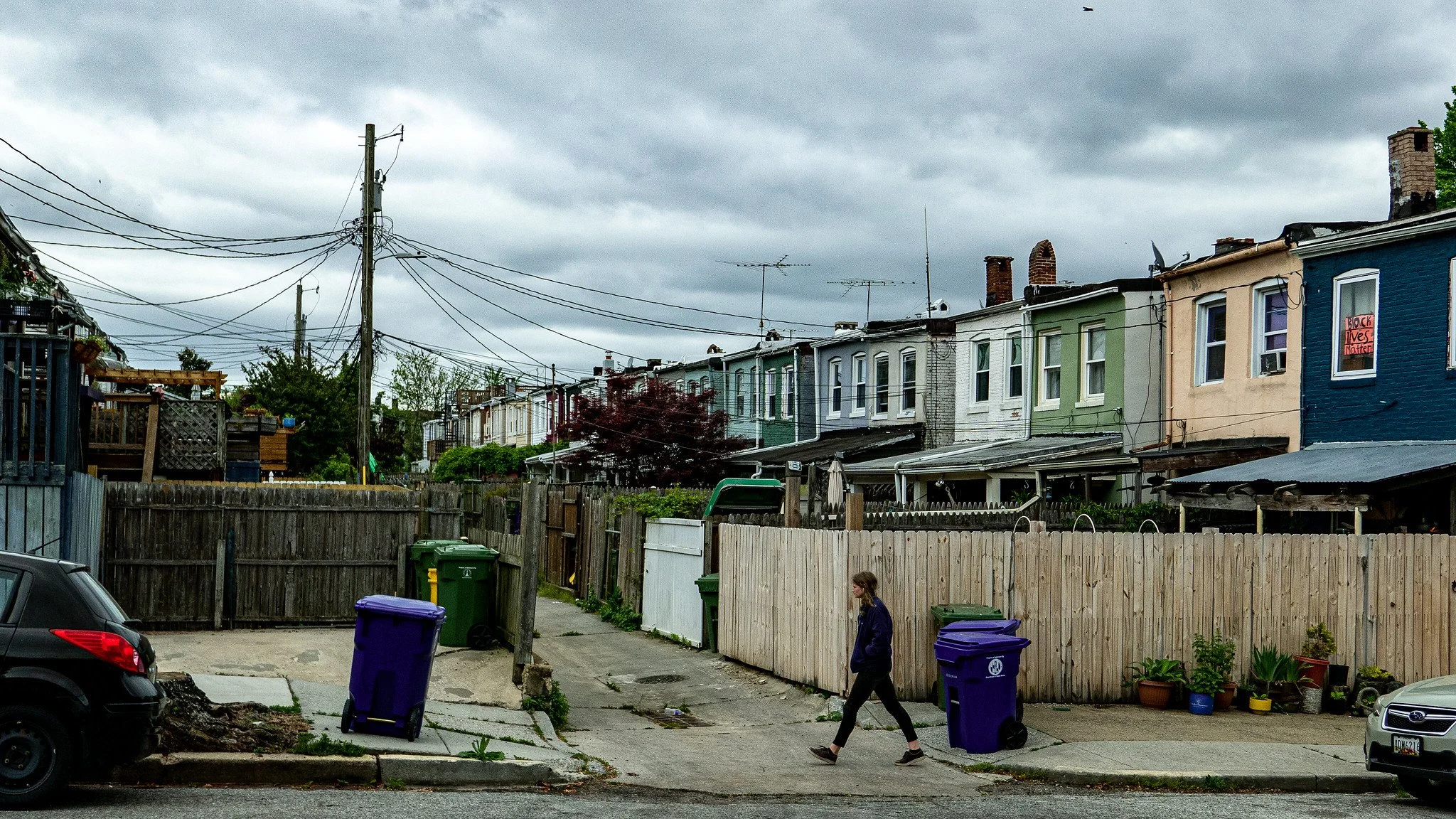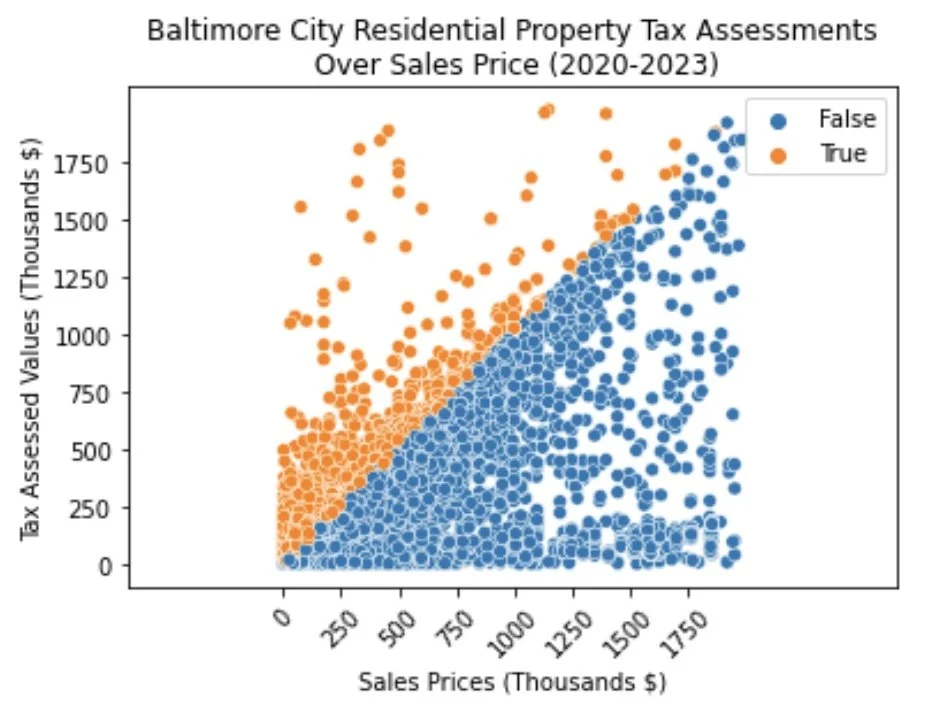Baltimore’s Property Tax System Robs the Poor to Pay for the Wealthy
Homes in Baltimore. (Source: Flickr/F Kim Hodgson.)
In Baltimore, some of the city’s least wealthy individuals may be overpaying on their property taxes by nearly $300 a year, whereas some of the richest could be underpaying by $14,000 or more.
These figures come from research conducted by Dr. Christopher Berry at the University of Chicago, who analyzed a series of assessed values from Baltimore properties that sold between 2009 and 2018. The report shows that 75% of the lowest-value homes are overassessed in Baltimore (meaning the homeowners may be overpaying their property tax bill). On the extreme end, a property that sold for $39,692 had a tax bill of $1,053.47, which is $315.26 or 42.7% above the fair tax. On the other extreme end, a property that sold for $1,146,458 had a tax bill of $6,419.08. If this property had been taxed at the average rate, the final bill would have been $21,322.76—meaning the homeowner of the million-dollar home underpaid by 69.9%.
Read more about Dr. Berry’s research: “How Lower-Income Americans Get Cheated on Property Taxes.”
Dr. Berry’s research is not the only study that reflects Baltimore’s inequitable property taxes. Strong Towns Baltimore member Randall Jadulang conducted a study focusing on whether home sale prices could be predicted, but as he started to gather and graph data from the county’s website, he noticed assessed values between 2020 and 2023 sales were still off.
“It was surprising how starkly obvious it was,” said Jadulang.
In the graph below, Jadulang showed the data from Baltimore homes under $2 million. It contrasts the sale price of recently sold Baltimore homes (on the x-axis) with the tax-assessed value of the same home (on the y-axis). Each orange dot represents a home assessed at higher than its sale price. Each blue dot represents a home assessed at less than its sale price. The graph reveals that low-valued homes were comparatively likely to be overassessed, while a very large majority of houses sold for over $1 million were assessed for less than their sale price, often substantially less.
"False" indicates that the property represented by a dot does not have a tax assessed value higher than its sales value, while "True" indicates that the property does have a tax assessed value higher than its sales value.
It’s a locally known fact that Baltimore residents pay higher property taxes than any other county in Maryland. As brought to light by Renew Baltimore, these high tax rates are one big reason people lose their homes from back taxes. And while homes sit empty after the city claims them for unpaid taxes, other homes are vacated by Baltimore residents who have the option to leave for more affordable places.
Vacating an expensive tax area is not unique to Baltimore. In Detroit, Michigan, thousands have lost their homes or left the city because of high property taxes. This has contributed to the city's high rate of vacant and neglected properties, which the mayor is now trying to reverse by implementing a land value tax.
Read more about the problem in “We Are All Detroit.”
Renew Baltimore has been advocating for a six-year plan that will effectively cut property tax rates nearly in half. There has been much debate and resistance over the proposal: as reported by The Baltimore Banner, the mayor and several city officials criticized the idea and said it would cripple several necessary budgeted services that Baltimore relies on.
Even acknowledging that city budgets are important to quality-of-life services, however, each year Baltimore continues to overtax the least wealthy and lose out on thousands of dollars from the most wealthy.
The entirety of the United States faces inequitable property taxes. Studies reflecting property tax inequities have been conducted by different groups in North Carolina, New York, and Vermont—and Dr. Berry’s research stretches nationwide. A great amount of research demonstrates that the majority of America’s poorest citizens are being overassessed (which generates higher taxes), and the wealthiest are underassesed (generating lower taxes).
For more information on this issue, check out this video: “How Our Property Tax System Robs The Poor to Pay For The Wealthy.”
Watch: “How Our Property Tax System Robs The Poor to Pay For The Wealthy”
RELATED STORIES
You can make your town a Strong Town. Learn how to host a Community Action Lab in 2024.







Seairra Jones serves as the Lead Story Producer for Strong Towns. In the past, she's worked as a freelance journalist and videographer for a number of different organizations. She currently resides between small-town Illinois and the rural Midwest with her husband, where they help manage a family homestead. When Seairra isn’t focusing on how to make our towns stronger, you can find her outside working on the farm, writing fictional tales in a coffee shop, or reading in a hammock.